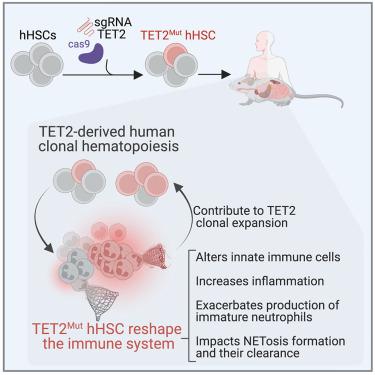Cell Stem Cell ( IF 23.9 ) Pub Date : 2023-06-01 , DOI: 10.1016/j.stem.2023.05.004 Hector Huerga Encabo 1 , Iker Valle Aramburu 2 , Manuel Garcia-Albornoz 1 , Marion Piganeau 1 , Henry Wood 1 , Anna Song 1 , Alessandra Ferrelli 1 , Aneesh Sharma 1 , Carlos M Minutti 3 , Marie-Charlotte Domart 4 , Despoina Papazoglou 1 , Kristian Gurashi 5 , Miriam Llorian Sopena 6 , Robert Goldstone 6 , Todd Fallesen 7 , Qian Wang 2 , Linda Ariza-McNaughton 1 , Daniel H Wiseman 5 , Kiran Batta 5 , Rajeev Gupta 8 , Venizelos Papayannopoulos 2 , Dominique Bonnet 1

|
Somatic mutations commonly occur in hematopoietic stem cells (HSCs). Some mutant clones outgrow through clonal hematopoiesis (CH) and produce mutated immune progenies shaping host immunity. Individuals with CH are asymptomatic but have an increased risk of developing leukemia, cardiovascular and pulmonary inflammatory diseases, and severe infections. Using genetic engineering of human HSCs (hHSCs) and transplantation in immunodeficient mice, we describe how a commonly mutated gene in CH, TET2, affects human neutrophil development and function. TET2 loss in hHSCs produce a distinct neutrophil heterogeneity in bone marrow and peripheral tissues by increasing the repopulating capacity of neutrophil progenitors and giving rise to low-granule neutrophils. Human neutrophils that inherited TET2 mutations mount exacerbated inflammatory responses and have more condensed chromatin, which correlates with compact neutrophil extracellular trap (NET) production. We expose here physiological abnormalities that may inform future strategies to detect TET2-CH and prevent NET-mediated pathologies associated with CH.
中文翻译:

人类造血干细胞中 TET2 的缺失改变了中性粒细胞的发育和功能
体细胞突变通常发生在造血干细胞 (HSC) 中。一些突变克隆通过克隆造血 (CH) 生长并产生突变的免疫后代,塑造宿主免疫力。CH 患者没有症状,但患白血病、心血管和肺部炎症性疾病以及严重感染的风险增加。利用人类 HSCs (hHSCs) 的基因工程和免疫缺陷小鼠的移植,我们描述了 CH 中常见的突变基因 TET2 如何影响人类嗜中性粒细胞的发育和功能。hHSC 中的 TET2 缺失通过增加中性粒细胞祖细胞的再增殖能力并产生低颗粒中性粒细胞,在骨髓和外周组织中产生明显的中性粒细胞异质性。遗传了 TET2 突变的人类嗜中性粒细胞会加剧炎症反应并具有更多浓缩染色质,这与致密嗜中性粒细胞胞外陷阱 (NET) 的产生有关。我们在这里揭示了生理异常,这些异常可能会为未来检测 TET2-CH 和预防 NET 介导的与 CH 相关的病理学策略提供信息。

























 京公网安备 11010802027423号
京公网安备 11010802027423号